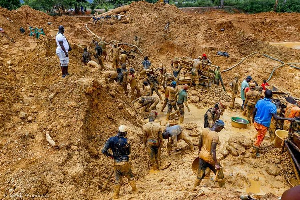 File photo of an illegal mining site in Ghana
File photo of an illegal mining site in Ghana
GhanaWeb Feature by Mawuli Ahorlumegah
Ghana, one of Africa’s leading gold producers, is witnessing a modern-day gold rush, driven by the surge in illegal small-scale mining activities, popularly known as ‘Galamsey’.
This illegal act of gold mining has been a major economic drive for individuals involved in it.
However, despite the financial gains, Ghana might soon be faced with the rather daunting task of dealing with the social and environmental risks of galamsey that threaten its future.
If you live in an urban area, you might assume that 'galamsey' activities are confined to remote regions. However, this assumption could be misleading, as the risks associated with these illegal mining activities are closer than we might think.
The rise of galamsey in Ghana
The word ‘galamsey’ is derived from the phrase "gather them and sell", referring to unregulated mining practices that have plagued the country’s river bodies and forests.
While some believe that galamsey offers high value in gold prices and employment opportunities, many Ghanaian youth have resorted to engaging in these activities as a means of livelihood.
Although the government has adopted several strategies to curb this uncontrolled menace, its devastating and long-lasting effects have become evident even for water supply agencies and health facilities.
Social and environmental impact of galamsey
Widespread galamsey activities have led to environmental destruction, pollution of water bodies, land degradation, and a looming health crisis for individuals.
At present, the environmental impact of galamsey activities in Ghana remains profound as miners involved in this act often use harmful chemicals such as mercury and cyanide to extract the gold. This then goes into rivers and streams to contaminate drinking water and destroy aquatic ecosystems.
This single but destructive activity has set the tone for severe health risks to local communities, resulting in mercury poisoning and respiratory problems that could take years to address or lead to deaths.
Additionally, deforestation caused by galamsey activities also poses significant risks to biodiversity and soil erosion.
Economic consequences
The famous Jay-Z lyric, "When the money goes, will the hunnies stay?" offers a satirical perspective to the short-term gains for these galamsey operators.
Their activities do not only undermine the formal gold sector but also impact the broader economy, as the country loses out on leveraging its natural resources through the right measures.
The illegal nature of galamsey activities means that gold sales will be conducted in an unregulated manner, depriving the government of significant revenues from taxes and royalties.
Also, the influx of galamsey operations disrupts local communities, leading to conflicts over land, farm produce, and increased crime rates, thereby affecting national security, which is critical for any growing economy.
The way forward
Tackling the issue of 'galamsey' hands-on will require a multi-faced approach that includes stricter enforcement of mining regulations, community engagements, and alternative support programs.
Additionally, formalising responsible small-scale mining could help ensure illegal miners are roped into the formal economy on the back of strong regulations and environmental oversight.
Rural and urban communities at large must be given thorough education on the environmental health risks associated with galamsey in order to change perceptions and behaviors regarding the menace.
Conclusion
The gold rush in Ghana, fueled by illegal galamsey activities, presents a complex challenge for the government and authorities as it threatens the environment, public health, economic stability, and national security.
To tackle this, the government must strictly adhere to stronger governance measures, enforcement of sustainable mining practices, and community involvement to curb the galamsey menace.
An intriguing video has surfaced showing numerous individuals of all ages and genders rushing into a galamsey pit in search of gold.
— SIKAOFFICIAL🦍 (@SIKAOFFICIAL1) September 3, 2024
This has raised questions on what the actual root causes of galamsey are. Is it mere ignorance about its environmental effects or simply… pic.twitter.com/vjCyfJUqA3
This is wickedness #StopGalamseyNow pic.twitter.com/uA6IDLUwKf
— Receipts Guy (@receiptsguy) September 4, 2024